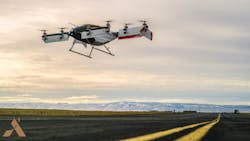Airbus said on Feb 2 that it had successfully held the first test flights of the Vahana, an electric, pilotless flying vehicle that it hopes will be able to ferry people around cities.
The flight at a test range in Oregon lasted just under one minute, with the aircraft lifting up five meters (16 feet) from the ground and landing without control from a pilot, the European aerospace firm said.
Propelled by eight rotors that allow it to take off and land vertically, Vahana completed a second test flight on Feb. 1, and additional testing is slated including forward flight.
The aircraft, which Airbus has been developing for less than two years, is designed to carry one passenger and fly autonomously.
"Vahana aims to democratize personal flight and answer the growing need for urban mobility by leveraging the latest technologies in electric propulsion, energy storage, and machine vision," Airbus said.
Autonomous driving technology has made considerable progress in recent years with high-tech firms and established automakers putting test vehicles on the roads, while a handful of inventors and start-ups have developed flying cars.
Copyright Agence France-Presse, 2018
About the Author
Agence France-Presse
Copyright Agence France-Presse, 2002-2025. AFP text, photos, graphics and logos shall not be reproduced, published, broadcast, rewritten for broadcast or publication or redistributed directly or indirectly in any medium. AFP shall not be held liable for any delays, inaccuracies, errors or omissions in any AFP content, or for any actions taken in consequence.
